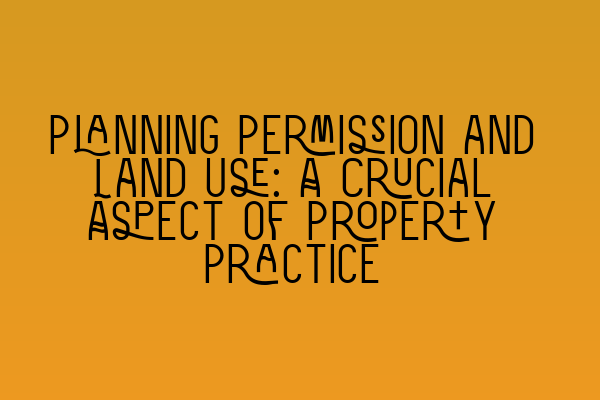Planning Permission and Land Use: A Crucial Aspect of Property Practice
As a property solicitor, understanding the intricacies of planning permission and land use is a crucial aspect of providing effective legal advice to clients. From residential developments to commercial ventures, the planning process plays a significant role in shaping the use and development of land. In this blog post, we will delve into the importance of planning permission, its legal framework, and its impact on property practice.
What is Planning Permission?
Planning permission is the formal consent required from the local planning authority for certain types of development or change of land use. It is a legal requirement designed to ensure that development is carried out in accordance with local and national policies, preserving the amenity and character of an area.
Obtaining planning permission is an essential step for anyone looking to build or alter a property, from homeowners seeking to extend their homes to property developers embarking on large-scale projects. Without proper planning permission, any construction or alteration may be deemed unlawful, leading to potential legal challenges and costly consequences.
The Legal Framework of Planning Permission
The legal framework governing planning permission is complex and encompassing. It includes legislation such as the Town and Country Planning Act 1990, as well as local development plans, national policies, and regional strategies. As a property solicitor, it is your role to interpret and navigate this framework on behalf of your clients.
The planning process begins with the submission of an application to the local planning authority, detailing the proposed development and its impact on the surrounding area. The authority then considers the application, taking into account various factors such as the suitability of the site, the impact on infrastructure, and any potential environmental consequences.
During this process, there may be public consultations, where local residents and interested parties can voice their opinions and raise concerns about the development. It is essential for property solicitors to be aware of any objections or issues raised during these consultations, as they may influence the outcome of the planning decision.
The Impact of Planning Permission on Property Practice
Having a thorough understanding of planning permission and land use is essential for property solicitors for several reasons:
- Guiding Clients: Property solicitors play a vital role in guiding clients through the planning process, advising them on the likelihood of obtaining planning permission, the conditions attached to it, and any potential legal obstacles they may face.
- Due Diligence: When handling property transactions, conducting due diligence on the planning history of a property is crucial. This involves reviewing previous planning permissions, enforcement notices, and any restrictions or conditions attached to them.
- Negotiating Section 106 Agreements: Section 106 agreements, also known as planning obligations, are legally binding agreements between developers and local authorities. These agreements secure contributions from developers to fund local infrastructure, affordable housing, or other community benefits. Property solicitors play a crucial role in negotiating and drafting these agreements on behalf of their clients.
- Resolving Disputes: Disputes can arise at any stage of the planning process, from objections raised during public consultations to challenges against planning decisions. Property solicitors need to have the skills to mediate and navigate through these disputes, ensuring the best outcome for their clients.
In conclusion, planning permission and land use are integral aspects of property practice. Whether you are assisting clients with residential or commercial property transactions, having a comprehensive understanding of the planning process and associated legal framework is essential. By advising clients on the complexities of planning permission, guiding them through the process, and resolving any disputes that may arise, property solicitors play a pivotal role in ensuring the successful development and use of land.
For more information on related topics, check out our articles:
- Misrepresentation in Contracts: Unveiling Deceptive Practices
- A Closer Look at SQE Contract Law Syllabus
- SQE Contract Law: Analyzing Landmark Cases and Influential Judicial Decisions
- Understanding Contractual Capacity: Rights and Limitations
- Interactive SQE Mock Tests for Contract Law: Test Your Knowledge
